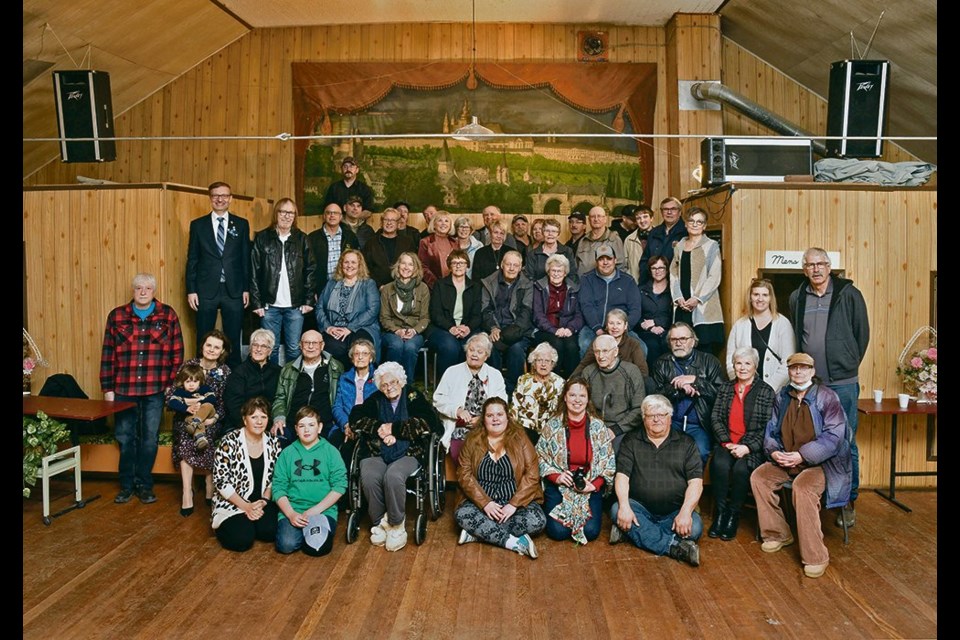ROSETOWN — The Rosetown, Sask., region hosted an ambassador April 26.
Borek Lizec, the ambassador of the Czech Republic to Canada, paid homage to the region’s Czechoslovakian culture when he and his wife, Katerina Lizcova Kulhankova, visited the Czechoslovakian Pioneers Memorial Hall north of Rosetown.
“It’s really touching to see that they stick with their Czech language even after 90 years being born here and sharing with me those stories of their ancestors is a special feeling,” said Lizec.
The community hall was the first stop of several that the couple and their young son are making in Saskatchewan and Manitoba. They also plan to visit Glenside, Esterhazy, Gerald and Winnipeg. Last year they travelled to Czech communities in Alberta.
“When we were driving here and saw the beautiful hall and historic sign on the hall, we got emotional,” said Lizcova Kulhankova. “It’s amazing, such a historic building that is still keeping alive the traditions and the community. And when we came inside, we were like, wow, this is amazing because we were honoured that so many people came to see us.”
Originally from Prague, Lizec has been the ambassador for the past 2.5 years, based in Ottawa.
He served in Chicago for eight years before that, primarily as consul general for the Czech Republic responsible for the midwestern region.
“The (U.S.) Midwest was the centre where the Czech farmers would go. That was the way into the United States between the 1850s and 1910. The second and third generations of these Czech children and grandchildren, some of them would continue and search for their own farm in Canada,” said Lizec.
fascinated with the history of Czech culture and immigration in North America, he has been on a journey to visit some of the remaining communities and their descendants to see where early Czechs homesteaded.
“I would like to reconnect with historic Czech communities that existed and exist in Canada. Many of them helped create Czechoslovakia during the First World War.
“I would like to thank the descendants of these Czechs who did so much for us in terms of political support and awareness of Canadian public to our cause, and also financially supporting the government in exile,” he said.
"It’s quite touching to see how they feel strongly still about their ancestry and how proud they are of it.”
Ed Guran is a first-generation Czech-Canadian whose parents purchased a farm in the Rosetown area after immigrating in 1926.
The community centre was built in 1929 by local Czech settlers and hosted events about every two weeks.
“This hall was a second home to me. There’re so many nice memories,” said Guran, 81. For 60 years, he and his wife, Cairin, were janitors for the hall.
He recalls the Christmas and New Year’s concerts, summer picnics, baseball and horseshoe tournaments, gymnastics and even a boxing match. Funerals, weddings and stag parties were also common.
Saturday night dances were a particular favourite.
“This place would just be buzzing. They had a really good local orchestra called the Bohemian Band for the dances.
“And we’ve celebrated three anniversaries here. My wife and I have been married for 60 years,” Guran said.
The old hall is still used but is showing its age. It received a new hardwood floor and renovations in the 1980s.
In his remarks to the gathering, Lizec said annual grants are available from the Czech Republic government to help support community events.
“This is something special for us to see, that after so many years you still are proud of your heritage and enjoy celebrating it. In this connection, I would say that we really don’t take it for granted,” he said.
Historically known as Bohemia, the Czech Republic is a landlocked country in central Europe that borders Austria, Germany, Poland and Slovakia. It has a hilly landscape as well as flatter farming areas, which suggests to Lizec the reason the original Czechs chose to settle on the Prairies.
Like many early immigrants, the chance for a better life motivated them to immigrate and escape political oppression in the former Czechoslovakia.
Four decades of communism during the Soviet era took a heavy toll on Czechs. Children who had immigrated were not allowed to communicate with relatives back home.
“The Cold War meant 40 years basically of silence,” said Lizec.
“There was no official representation, but they didn’t have the interest in talking to free democratic thinking Czechs. So, in some ways, I really feel sorry for this wonderful story of friendship that it was hidden for some time.”
Now Russia’s war on Ukraine could see history repeat itself, he said.
“It’s really incredible how accurate this parallel is in many ways…. The same things are now happening in the Ukraine.”
Lizcova Kulhankova also noted the parallel.
“I think that especially now in the Czech Republic people feel how important it is to help each other, so we are really trying to help our Ukrainian friends,” she said.
“There are many tragic stories and I hope they will be able again to find their families together and get their homes again because they are losing everything in Ukraine. I really hope that we can help them to establish their lives back.”




